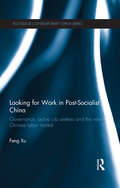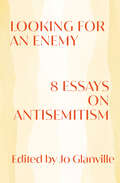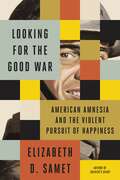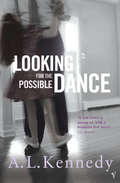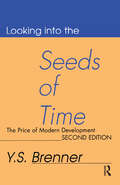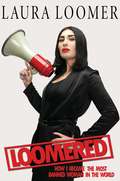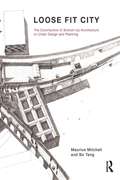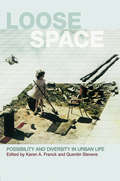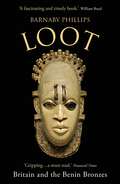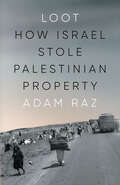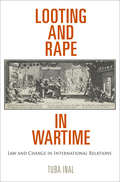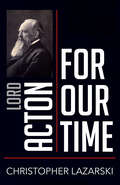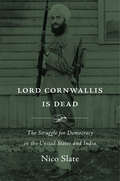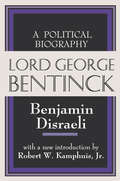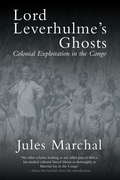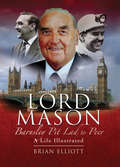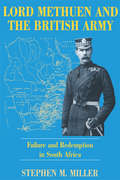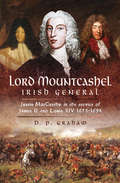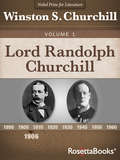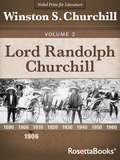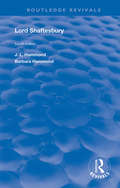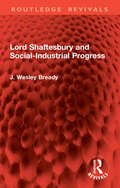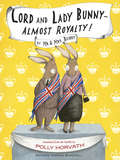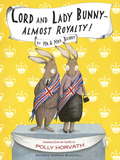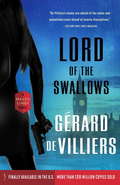- Table View
- List View
Looking for Work in Post-Socialist China: Governance, Active Job Seekers and the New Chinese Labour Market (Routledge Contemporary China Series)
by Feng XuUnemployment is one of the most politically explosive issues in China and has gained further prominence as a result of the present global financial crisis. The novelty, urgency, and complexity of Chinese unemployment have compelled the government to experiment with policy initiatives that originate in the West. This book argues that although China is not a liberal democracy, it has turned to neo-liberal forms of governance to deal with unemployment, which now function alongside pre-existing Chinese modes of governance. This book examines the initiatives which represent China’s attempt to institutionalize and humanize its approach to governance: these initiatives include training programmes; counselling; a web-based national labour-market information network; insurance; and using community (shequ) organizations as the base for new mechanisms of governance and informal job generation. Based on extensive original research including semi-structured interviews, the book discusses the ways in which the government combines the new techniques with old campaign-style policy techniques. The author argues that these multiple modes of governance make the state's power visible in the new Chinese labour market, and at the same time run the risk of policy incoherence or even failure.
Looking for an Enemy: 8 Essays on Antisemitism
by Jo GlanvilleGreat Jewish thinkers offer salient historical commentary on the roots of antisemitism and its contemporary resurgence. From medieval accusations that Jews murder Christians for their blood to the far-right conspiracy theories animating present-day political discourse, it’s clear that the belief that Jews are plotting against society never dies—it just adapts to suit the times. In eight illuminating essays from brilliant Jewish writers and thinkers, Looking for an Enemy offers an urgent, profound take on the experience of antisemitism and its historical context. In order to present a nuanced, global understanding of antisemitism, editor Jo Glanville solicited essays from writers across a wide spectrum of ages, political ideologies, and nationalities. American rabbi Jill Jacobs and respected Israeli historian Tom Segev explore the thorny question of antisemitism in politics. British journalist Daniel Trilling investigates how antisemitism drives far-right extremism, while author Philip Spencer rethinks the forms that antisemitism takes on the left. Polish writer Mikolaj Grynberg reflects on a childhood shadowed by the trauma of the Holocaust; journalist Natasha Lehrer and novelist Olga Grjasnowa explore the culture of antisemitism, and the forces behind it, in France and Germany. In her own contribution, Glanville searches for the historical roots of this dangerous hatred. In moving memoir, rich history, and incisive political commentary, these essays navigate the complex differences in each country’s relationship to its Jewish citizens and reveal the contemporary face of antisemitism. Eye-opening and evocative, Looking for an Enemy explores how an irrational belief can still flourish in a supposedly rational age.
Looking for the Good War: American Amnesia and the Violent Pursuit of Happiness
by Elizabeth D. Samet"Essential reading. This eloquent, far-ranging analysis of the national psyche goes as far as any book I've ever read toward explaining the peculiar American yen for war and more war." —Ben Fountain, author of Billy Lynn's Long Halftime Walk and Beautiful Country Burn AgainIn Looking for the Good War, Elizabeth D. Samet reexamines the literature, art, and culture that emerged after World War II, bringing her expertise as a professor of English at West Point to bear on the complexity of the postwar period in national life. She exposes the confusion about American identity that was expressed during and immediately after the war, and the deep national ambivalence toward war, violence, and veterans—all of which were suppressed in subsequent decades by a dangerously sentimental attitude toward the United States’ “exceptional” history and destiny. Samet finds the war's ambivalent legacy in some of its most heavily mythologized figures: the war correspondent epitomized by Ernie Pyle, the character of the erstwhile G.I. turned either cop or criminal in the pulp fiction and feature films of the late 1940s, the disaffected Civil War veteran who looms so large on the screen in the Cold War Western, and the resurgent military hero of the post-Vietnam period. Taken together, these figures reveal key elements of postwar attitudes toward violence, liberty, and nation—attitudes that have shaped domestic and foreign policy and that respond in various ways to various assumptions about national identity and purpose established or affirmed by World War II.As the United States reassesses its roles in Afghanistan and the Middle East, the time has come to rethink our national mythology: the way that World War II shaped our sense of national destiny, our beliefs about the use of American military force throughout the world, and our inability to accept the realities of the twenty-first century’s decades of devastating conflict.
Looking for the Possible Dance
by A.L. KennedyMary Margaret Hamilton was educated in Scotland. She was born there too. These may not have been the best possible options, but they were the only ones on offer at the time. Although her father did his best, her knowledge of life is perhaps a little incomplete. Margaret knows the best way to look at the moon, how to wake on time and how to breathe fire. Now she must learn how to live. A. L. Kennedy's absorbing, moving and gently political first novel dissects the intricate difficulties of human relationships, from Margaret's passionate attachment to her father and her more problematic involvement with Colin, her lover, to the wider social relations between pupil and teacher, employer and employee, individual and state.
Looking into the Seeds of Time: The Price of Modern Development
by Y. S. BrennerThis stunning, refreshing work combines the history of economics and the practice of modern development. It is predicated on Brenner's view that there is no individual freedom without economic security, and that such security depends upon progress in both the natural and social sciences. Social institutions determine the pace and direction of technological advancement and scientific and technological achievements determine which forms of social reorganization are possible and which are illusory. As all living is action, and living implies choices, any theory of development must start with the person. Economic laws obtain only in relation to specific forms of social existence. Advanced societies are technically capable of providing for basic needs but are not yet convinced of their ability to do so. Modern life still reflects the fears of a society still trying to escape the anxieties, demons, and ghosts of a long dark era of unemployment and starvation. The problem of development is the contradiction between technological potentials and cultural inheritances. Looking into the Seeds of Time was originally written with the belief that the growing mastery of nature by humanity would curb egoistic impulses and replace competitive with cooperative goals. While the same spirit pervades this new edition, the work reveals how political as well as economic processes make the goals of prosperity harder to achieve. The work reveals a rare insight into the mechanisms of the marketplace, and how they can be examined in a comparative, historical context-across nations as different as the United States, Great Britain and Japan, and from the Reformation to the modern era of bourgeois consolidation. This is institutional economics at its very best.
Loomered: How I Became the Most Banned Woman in the World
by Laura LoomerLaura Loomer is the most banned woman in the world.An investigative journalist, activist, and truth-teller who has earned many powerful enemies in Silicon Valley and the media, Loomer has been banned from Facebook, Twitter, Instagram, Uber, Lyft, Uber Eats, PayPal, Venmo, GoFundMe, Periscope, Medium, and TeeSpring…so far. Loomer works tirelessly for Americans banned from essential online services for having the wrong political opinions. In addition to filing lawsuits against the companies that have wrongfully ostracized and defamed her, she is running for Congress in Florida&’s 21st District. This is her story.
Loose Fit City: The Contribution of Bottom-Up Architecture to Urban Design and Planning
by Maurice Mitchell Bo TangDrawn from a lifetime’s experience of shared city-making from the bottom up, within rapidly expanding urban metabolisms in Delhi, Mumbai, Agra, Kathmandu, West Africa and London, Loose Fit City is about the ways in which city residents can learn through making to engage with the dynamic process of creating their own city. It looks at the nature and processes involved in loosely fitting together elements made by different people at different scales and times, with different intentions, into a civic entity which is greater than the sum of its parts. It shows how bottom-up learning through making can create a more vibrant and democratic city than the more flattened, top-down, centrally planned, factory made version. Loose Fit City provides a new take on the subject of architecture, defined as the study and practice of fitting together physical and cultural topography. It provides a comprehensive view of how the fourth dimension of time fits loosely together with the three spatial dimensions at different scales within the human horizon, so as to layer meaning and depth within the places and metabolism of the city fabric.
Loose Space: Possibility and Diversity in Urban Life
by Karen A. Franck Quentin StevensIn cities around the world people use a variety of public spaces to relax, to protest, to buy and sell, to experiment and to celebrate. Loose Space explores the many ways that urban residents, with creativity and determination, appropriate public space to meet their own needs and desires. Familiar or unexpected, spontaneous or planned, momentary or long-lasting, the activities that make urban space loose continue to give cities life and vitality. The book examines physical spaces and how people use them. Contributors discuss a wide range of recreational, commercial and political activities; some are conventional, others are more experimental. Some of the activities occur alongside the intended uses of planned public spaces, such as sidewalks and plazas; other activities replace former uses, as in abandoned warehouses and industrial sites. The thirteen case studies, international in scope, demonstrate the continuing richness of urban public life that is created and sustained by urbanites themselves Presents a fresh way of looking at urban public space, focusing on its positive uses and aspects. Comprises 13 detailed, well-illustrated case studies based on sustained observation and research by social scientists, architects and urban designers. Looks at a range of activities, both everyday occurrences and more unusual uses, in a variety of public spaces -- planned, leftover and abandoned. Explores the spatial and the behavioral; considers the wider historical and social context. Addresses issues of urban research, architecture, urban design and planning. Takes a broad international perspective with cases from New York, London, Berlin, Amsterdam, Rome, Guadalajara, Athens, Tel Aviv, Melbourne, Bangkok, Kandy, Buffalo, and the North of England.
Loot: Britain and the Benin Bronzes (Modern Classics Ser.)
by Barnaby Phillips&‘A fascinating and timely book.&’ William Boyd &‘Gripping…a must read.&’ FT In 1897, Britain responded to the killing of a group of officials by razing an empire to the ground. The men had been travelling to the ancient Kingdom of Benin, in what is now Nigeria, when they were ambushed and killed by local soldiers. Just six weeks later, the British had exacted their revenge, set Benin aflame, exiled the king and annexed the territory. They also made off with some of Africa&’s greatest works of art.This is the story of the &‘Benin Bronzes&’, their creation, removal, and what should happen to them now. When first exhibited in London they caused a sensation and helped reshape European attitudes towards Africa, challenging the prevailing view of the continent as &‘backward&’ and without culture. But seeing them in the British Museum today is, in the words of one Benin City artist, like &‘visiting relatives behind bars&’. In a time of fevered debate about the legacies of empire, loot, museums and history, what does the future hold for the Bronzes themselves?
Loot: How Israel Stole Palestinian Property
by Adam RazExiled in 1948, Palestinians were robbed of their private property when looting became weaponizedDuring the 1948 War, Israeli fighters and residents alike plundered Palestinian homes, shops, businesses, and farms. This bitter truth was then suppressed or forgotten over the coming years.Tens of thousands took part in the pillage of Palestinian property, stealing the belongings of their former neighbours. The implications of this mass looting go far beyond the personality or moral fibre of those who took part. Plundering served a political agenda by helping to empty the country of its Palestinian residents. In this context, it was part of the prevailing policy during the war – one designed to crush the Palestinian economy, destroy villages, and to confiscate and sometimes destroy crops and harvests remaining in the depopulated zones.The participating Jewish public became a stakeholder, motivated to prevent Palestinian residents from returning to the villages and cities they had left. These ordinary people were mobilized in the push for the segregation of Jews and Arabs in the early years of statehood.With painstaking original research into primary sources, Adam Raz has brought to light a tragic moment in the history of a conflict that roils the region and the wider world. As the details of the Nakba are understood and documented, redress for Palestinian grievances comes closer to reality.
Looting and Rape in Wartime
by Tuba InalWomen were historically treated in wartime as property. Yet in the Hague Conventions of 1899 and 1907, prohibitions against pillaging property did not extend to the female body. There is a gap of nearly a hundred years between those early prohibitions of pillage and the prohibition of rape finally enacted in the Rome Statute of 1998. In Looting and Rape in Wartime, Tuba Inal addresses the development of these two separate "prohibition regimes," exploring why states make and agree to laws that determine the way war is conducted, and what role gender plays in this process.Inal argues that three conditions are necessary for the emergence of a global prohibition regime: first, a state must believe that it is necessary to comply with the prohibition and that to do otherwise would be costly; second, the idea that a particular practice is undesirable must become the norm; finally, a prohibition regime emerges with state and nonstate actors supporting it all along the way. These conditions are met by the prohibition against pillage, which developed from a confluence of material circumstances and an ideological context: the nineteenth century fostered ideas about the sanctity of private property, which made the act of looting seem more abhorrent. Meanwhile, the existence of conscripted and regulated armies meant that militaries could take measures to prevent it. In that period, however, rape was still considered a crime of passion or a symptom of behavioral disorder--in other words, a distortion of male sexuality and outside of state control--and it would take many decades to erode the grip of those ideas. Only toward the end of the twentieth century did transformations in gender ideology and the increased participation of women in politics bring about broad cultural shifts in the way we perceive sexual violence, women, and women's roles in policy and lawmaking.In examining the historical and ideological context of how these two regimes evolved, Looting and Rape in Wartime provides vital perspective on the forces that block or bring about change in international relations.
Lord Acton for Our Time (People for Our Time)
by Christopher LazarskiLord Acton for Our Time illuminates the thought of the English historian, politician, and writer who gave us the famous maxim: "Power tends to corrupt, and absolute power corrupts absolutely." Extracting lessons for our current age, Christopher Lazarski focuses on liberty—how Acton understood it, what he thought was its foundation and necessary ingredients, and the history of its development in Western Civilization. Acton is known as a historian, or even the historian, of liberty and as an ardent liberal, but there is confusion as to how he understood liberty and what kind of liberalism he professed. Lord Acton for Our Time provides an introduction that presents essentials about Acton's life and recovers his theory of liberalism. Lazarski analyzes Acton's type of liberalism, probing whether it can offer a solution to the crisis of liberal democracy in our own era. For Acton, liberty is the freedom to do what we ought to do, both as individuals and as citizens, and his writings contain valuable lessons for today.
Lord Cornwallis Is Dead: The Struggle for Democracy in the United States and India
by Nico SlateDo democracies bring about greater equality among their citizens? India embraced universal suffrage in 1947 and yet its citizens are far from realizing equality. The U.S. struggles with intolerance and inequality well into the twenty-first century. Nico Slate offers a new look at the struggle for freedom that linked two former British colonies.
Lord George Bentinck: A Political History
by Benjamin DisraeliLord George Bentinck is an account of Disraeli's relation with his parliamentary colleague and friend. It is not simply an account of the battle over the Corn Laws with Sir Robert Peel, but a most remarkable book, extremely readable, and full of often quoted and apt comments and descriptions. As a vivid story of one of the great parliamentary dramas in British history it is unsurpassed. The portraits of both Bentinck and Peel are both sympathetic and just. The book provides insight into mid-nineteenth century parliamentary life that remains unsurpassed.It is hard to overstate the bitterness and fury which Peel's decision to repeal the Corn Laws had provoked in British politics. One biographer of Disraeli, Robert Blake, spoke of "Home Rule in 1886 and Munich in 1938 as the nearest parallels". Friendships were sundered, families divided, and the feuds of politics carried into private life to a degree quite unusual in British history. Those who are interested in the details of parliamentary warfare which raged until Peel's fall from power should consult Lord George Bentinck. But the worth of this book goes beyond constitutional history or even the Irish food famine. Disraeli helps explain the intellectual and ideological grounds of the Young England Movement: a conservative force that aimed at a union of discontented industrial workers with aristocratic landowners and against factious Whigs, selfish factory owners and dissenting shopkeepers. In forging such a policy of principle, the Conservatives, as Disraeli's book well demonstrates, became a minority party but one which carried the full weight of moral politics.
Lord Leverhulme's Ghosts: Colonial Exploitation in the Congo
by Jules MarchalIn the early twentieth century, the worldwide rubber boom led British enterpreneur Lord Leverhulme to the Belgian Congo. Warmly welcomed by the murderous regime of King Leopold II, Leverhulme set up a private kingdom reliant on the horrific Belgian system of forced labor, a program that reduced the population of Congo by half and accounted for more deaths than the Nazi Holocaust. In this definitive, meticulously researched history, Jules Marchal exposes the nature of forced labor under Lord Leverhulme’s rule and the appalling conditions imposed upon the people of Congo. With an extensive introduction by Adam Hochschild, Lord Leverhulme’s Ghosts is an important and urgently needed account of a laboratory of colonial exploitation.
Lord Mason, Barnsley Pitlad to Peer: A Life Illustrated
by Brian ElliottRoy Mason swapped the colliery for Westminster when elected MP for Barnsley in 1953. He went on to become one of the leading figures in the Labour Party during the 1960s and 1970s, holding a number of prestigious offices including Defence Secretary from 1974 and Secretary of State for Northern Ireland from 1976. This photographic biography presents images from Mason's own archive charting his personal and political life from the Yorkshire pits to the House of Lords.
Lord Methuen and the British Army: Failure and Redemption in South Africa
by Stephen M. MillerThis study analyzes the readiness of the British military establishment for war in 1899 and its performance in the South African War (1899-1902). It focuses on the career of Field Marshal Paul Sanford, 3rd Baron Methuen, whose traditional military training, used so effectively in Queen Victoria's small wars, was put to the test by the modern challenges of the South African War. A subsidiary aim of this work is to correct and refine the historical consensus that Methuen's campaing in the South African War was plagued by practical errors and poor judgement. The South African War was a crucial transitional episode in the history of the British army. Unlike Great Britain's other expeditions, it required the concentrated resources of the entire empire. It was a modern war in the sense that it employed the technology, the weaponry, the communications, and the transportation of the second industrial revolution.
Lord Mountcashel: Justin MacCarthy in the Service of James II and Louis XIV, 1673–1694
by D. P. GrahamJustin MacCarthy (later Lord Mountcashel) was born into a notable family of Irish Jacobites, loyal to the exiled Stuarts, and grew up in France. Their Irish land was regained after the Restoration of Charles II but Justin, as the youngest surviving son, sought a career in the French army (as both his father and oldest brother had done). In 1673 he joined an Irish regiment in French service. He served under the legendary French marshals Turenne and Conde against the Dutch and their Imperial allies and by 1676 was commanding the regiment. He became part of the personal circle of the Catholic Duke of York, the future James II and, after the latters accession in 1685, Justin helped to transform the Irish army into a Catholic one.When James II was deposed in the Glorious Revolution of 1688 and fled via France to Ireland, Justin was one of the most experienced commanders resisting Williams invasion. Unfortunately MacCarthy was defeated at the Battle of Newtownbutler (1689), wounded and captured. He escaped and again went into exile in France, where he was the first commander of the famous Irish Brigade until his death in 1694.
Lord Randolph Churchill Volume 1 (Lord Randolph Churchill #1)
by Winston S. ChurchillThe first volume of the Nobel Prize-winning Prime Minister&’s biography of his father, the fiery Conservative Party leader of late Victorian Britain. In 1906, Sir Winston Churchill produced a two-volume biography of his father Lord Randolph Churchill, the 19th century Member of Parliament whose political career ended in scandal. This first volume deals with early events in Randolph&’s life, including his upbringing, his education, and his election to the House of Commons as the Conservative MP for Woodstock. This volume also recount&’s Randolph&’s quarrel with the Prince of Wales in a daring gambit to protect the integrity of the Churchill family name. This episode resulted in Churchill&’s temporary exile from British high society, a prequel to his later disgrace. While Winston Churchill is clearly a supporter of his father&’s, he is not afraid to be honest about the mistakes and failures of his career and personal life.
Lord Randolph Churchill Volume 2 (Lord Randolph Churchill #2)
by Winston S. ChurchillThe second volume of the Nobel Prize-winning Prime Minister&’s biography of his father, the controversial Victorian era British MP. In 1906, Sir Winston Churchill produced a two-volume biography of his father Lord Randolph Churchill, the 19th century Member of Parliament whose political career ended in scandal. This second volume detail&’s the elder Churchill&’s emergence as an independent leader who challenged the old guard of his own Conservative Party. As an obscure and overlooked backbench MP, Randolph established a cohort of Tory rebels known as the &“fourth party.&” Though excluded from British high society, he nevertheless made a name for himself and rose to become Chancellor of the Exchequer. But as he was on course to run for Prime Minister, his confrontational style led to a career-ending blunder.
Lord Shaftesbury (Routledge Revivals)
by Barbara Hammond J. L. HammondOriginally published in 1923, this book covers the career of Lord Shaftesbury from his early career, through Peel's government and factory legislation, and onto religion and philanthropy. His name recalls great achievements in the reform of law; a powerful force in debates and contests, on the issue of which depended the fortunes of England, and he helped to both create and destroy institutions, habits and beliefs to great consequence of his successors.
Lord Shaftesbury and Social-Industrial Progress (Routledge Revivals)
by J. Wesley BreadyOriginally published in 1926, this volume is much more than a biography of an outstanding politician, social reformer and philosopher. It provides an analysis of the history of social conditions in England during the nineteenth century, as well as a discussion of the development of social affairs and the inertia of political psychology. The role that faith and religion played in motivating Lord Shaftesbury’s desire for social reform is also discussed as is the ways in which he and John Wesley transformed the social and ethical ideas of England to enshrine in law many of the working conditions that we take for granted today such as defined hours of work and rest periods.
Lord and Lady Bunny — Almost Royalty!: Almost Royalty!
by Polly HorvathLiterature’s most endearing rabbits are back in this sequel to Mr. and Mrs. Bunny — Detectives Extraordinaire! While the Bunnys' human friend, Madeline, worries about saving money for college, Mrs. Bunny is more concerned about how to become a queen.Unexpectedly, Madeline’s family inherits a sweet shop (candy store!) in England, and it looks for a while as if everyone’s problems are solved. England proves to be full of eccentric characters, strange customs, and even royalty — but holding onto money is difficult for Madeline’s family, and becoming a queen proves harder than Mrs. Bunny had expected.Lord and Lady Bunny is written by Mr. and Mrs. Bunny,* translated from the Rabbit by multi-award-winning author Polly Horvath, and beautifully illustrated by Sophie Blackall. It’s a sequel that children will laugh over and love.* Mr. and Mrs. Bunny lives in Rabbitville in the Cowichan Valley on Vancouver Island, British Columbia. They have twelve children.
Lord and Lady Bunny--Almost Royalty!
by Polly Horvath Sophie BlackallIn this hilarious sequel to Mr. and Mrs. Bunny--Detectives Extraordinaire!--that even includes a guest appearance by J. K. Rowling a.k.a. "Oldwhatshername"--Madeleine wants nothing more than to save money for college, but her impractical, ex-hippie parents are broke. When the family unexpectedly inherits a sweet shoppe in England that has the potential to earn serious profit, they see an answer to all their problems. . . . Meanwhile, Mr. and Mrs. Bunny--formerly of the detecting persuasion--are looking for new professions, and Mrs. Bunny decides she would like to be Queen. Soon they, too, are headed across the pond. Brought to you by National Book Award-winning author Polly Horvath and illustrator Sophie Blackall, the adventures of Madeleine and the Bunnys are zanier than ever.
Lord of the Swallows
by Gérard De VilliersA sexy, high-stakes thriller in which Malko Linge must choose between his sense of duty and his sense of honor. At a benefit dinner in Monaco, Austrian playboy and CIA freelancer Malko Linge meets an intriguing woman, Zhanna Khrenkov, who has an unusual proposal. She will disclose everything she knows about her husband Alexei's business, provided Malko kills Alexei's beautiful young British mistress. Appalled, he refuses, but then Zhanna reveals that her husband runs a ring of sleeper Russian spies, operating undercover inside the U.S. Naturally, Malko's CIA handlers would love to have this information, But he feels uncomfortable killing anyone in cold blood--especially a beautiful woman. Traveling from Vienna to London to Moscow and back, aided by his former CIA handler and sometime lover Gwyneth Robertson, Malko strives to avoid the crosshairs of deadly assassins and--almost as dangerous--jealous lovers.
